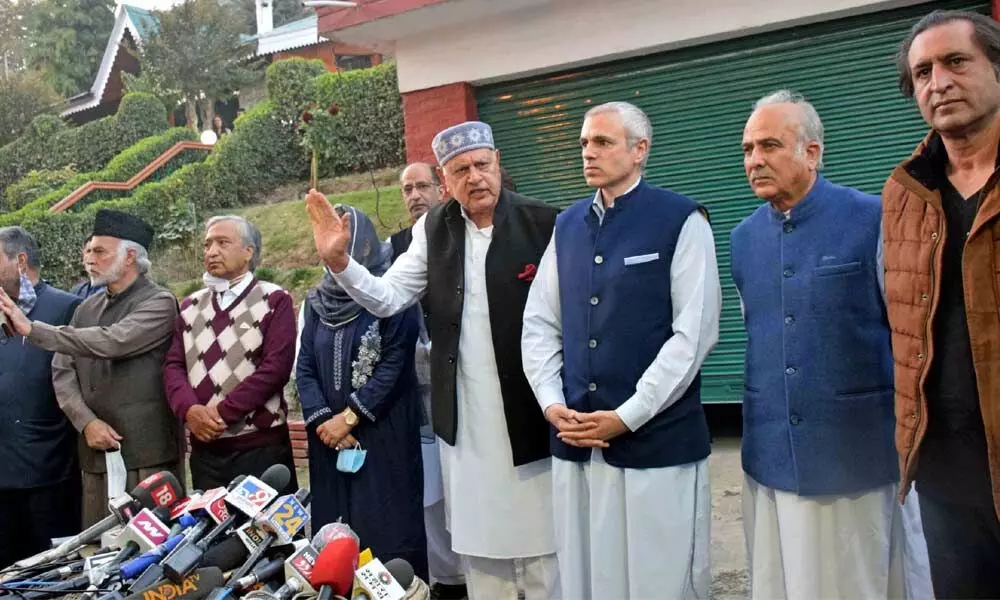Live
- Supreme Court Limits Definition of "Material Resources of the Community"
- MP CM approves reservation for women upto 35 pc
- JMM-Cong-RJD plotted to alter Jharkhand's demography via land jihad, love jihad: Yogi Adityanath
- Country’s first museum on women achievers to open in Delhi next year: L-G
- India's Wedding Season Set to Generate Rs 6 Lakh Crore in Business, Marking 41% Growth
- Kharge campaigns in Jharkhand, replies to BJP’s ‘batenge toh katenge’ slogan
- Addressing shortage of qualified professionals in Indian healthcare crucial: Report
- Career opportunities in sustainable farming
- India Game Developer Conference 2024 to be held from November 13-15
- Former Rajasthan Minister Mahesh Joshi And 22 Others Face Allegations In ₹1000-Crore Jal Jeevan Mission Scam
Just In
What is the 'right time' for J&K to be declared a State?


What is the ‘right time’ for J&K to be declared a State?
After two years of rule under the Union government, the State-turned-Union Territory of Jammu & Kashmir is set to have their first assembly elections soon to have its own locally elected government
After two years of rule under the Union government, the State-turned-Union Territory of Jammu & Kashmir is set to have their first assembly elections soon to have its own locally elected government. Currently, the delimitation exercise for the constituencies is underway and the elections are probably going to be held next year.
Interestingly, Prime Minister Narendra Modi, in his meeting with stakeholders on June 24 hinted at restoring statehood to Jammu & Kashmir at the 'right time.' If at all it happens after the peaceful elections, it will be a welcome move for all the regional parties. It may be recalled that in August 2019, the union government took away the special status of Jammu & Kashmir granted under Article 370 and made Ladakh and Jammu & Kashmir as union territories.
However, this assurance of the PM now cannot be deemed as the surrender of Modi government to the regional demands. So, this opens up the room for speculation of the 'right time' and what made the Centre to think of such a move. One theory is that the underlying agenda behind separating Ladakh and Jammu & Kashmir into two union territories was just to strip it of its special status under Article 370. Since that agenda is achieved, the Union government wants to withdraw the Union territory status by restoring statehood.
The other theory would be that in its two years of prolonged experiment, the Centre is no longer finding its sway in the union territory. The BJP's poor performance in the panchayat elections held recently may be one reason for it. In the DDC elections held in December 2020, BJP performed well only in the Hindu-dominated Jammu and managed to win only three seats in Kashmir. Some sections of the media are attributing the move to Modi's 'internal and external politics.'
What if restoration happens?
The question remains whether Ladakh region, which is now a separate union territory, will be integrated to make Jammu & Kashmir a State again or will this region be kept as union territory. Experts say that Ladakh will mostly likely remain as a Union territory as the Chinese incursions there are a hurdle in the way of its re-merger into Jammu & Kashmir. The Chinese incursions started in the region immediately after revocation of Article 370 as the neighbouring country seeks to claim control over parts of Ladakh.
Recently, Jammu & Kashmir administration announced ending the 149-year-old practice of Darbar move. It is the changing of capital from Jammu during winter to Srinagar during summer. Then, in the near future when the Statehood is restored, it is for one to speculate about the need for ending the Darbar move. Also, lots of expenditure will again be incurred in shifting back to the Statehood system.
Aftermathpolitics
Restoration of Article 370 and 35A that guarantees the special status to Jammu & Kashmir is also one of the many demands of the local regional parties. However, restoring Statehood does not mean giving back the special status. It is not on the agenda as of now. The stripping away of Articles 370 and 35A were manifesto promise of the BJP under Modi. And now, it is very much unlikely that Modi government will overturn it. So, the parties will have to continue to demand for special status. The Articles 370 and 35A provide for autonomy to formulate laws for the State's permanent residents. Nothing can be said about how peaceful the aftermath politics can be.
Will it bring any relief to Kashmir valley and ease tensions?
The Kashmir valley tensions are a legacy of 1947 post-partition days and these were prevailing even before Article 370 was revoked and Statehood was taken away. Although China and Pakistan have been seeking to whip up border tension too post the two developments, the Kashmir 'conflict' is not directly linked to this. Hence it is less likely that restoration of Statehood will bring any change in Kashmir valley situation. Now one has to see how quickly this 'right time' will come and change in the power politics in Jammu & Kashmir.

© 2024 Hyderabad Media House Limited/The Hans India. All rights reserved. Powered by hocalwire.com






